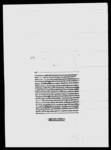An arjī from Lokaramaṇa Upādhyāya re a conversation with James Prinsep (VS 1895)
ID: DNA_0001_0075
Edited and
translated by Manik Bajracharya, Simon Cubelic, Rajan Khatiwoda
in collaboration with
Rabi Acharya
Created: 2016-02-25;
Last modified: 2022-11-22
For the metadata of the document, click here
The accompanying edition, translation/synopsis and/or commentary are available under the terms of the Creative Commons Attribution-ShareAlike 4.0 International License
Abstract
In this arjī, Lokaramaṇa Upādhyāya reports about his conversation with James Prinsep on the detention of Māthavara Siṃha Thāpā by the British in Ludhiana, the occupation of British territory in Darjeeling by the Nepalese army and a potential military alliance against the British.Diplomatic edition
[1r]
1⟪नं.७५⟫1अर्जि¯ ¯ ¯ ¯ ¯ ¯ ¯ ¯ ¯ ¯ ¯ ¯ ¯ ¯ ¯ ¯ ¯ ¯ ¯ ¯ ¯ ¯ ¯ ¯ ¯2उप्रान्तजामजाहानुमाफार्सिअषवार्मानेपालकोव़किललुधिञानामाकएद्छभनिछाप्याकोरहेछ
3देसावर्का[?]तिरकोषवरअषवार्माछाप्याकोरहेछरअषवारहजुरमाचह्राइपठायाको[?]
4जाहेरहोलाश्रावणवदि६रोज६कादिनवुझ्नभनिअंरेजहरूकाहाजादाजिमिसप्रेन्सिप्साहवटक्सा
5लकावडासाहवहुन्उन्सितभेटहुदानेपालवाटदोस्तमहमदषाँकाहाँव़किलभैमातवर्सिंहथापाजा
6दारह्याछन्लुधिञानामापकडियाकाछन्भन्दासुनिन्छदोस्तिकामोकाममा•एस्तोवातचाहिन्याहोइन
7कसोहोभनिमसितसोध्या•य़ोवातकेहिभय़ादेषिमलाइलेषिआव़न्याहोकेहिलेषिनआउदासच्चाहोलाभ
8न्याजस्तोलाग्दैनमातवर्सिंहथापाहरूकामदेषिषारिजभयाकाछन्ञाहासवैसाहवानहरूलाइमालु[?]
9छकावुलमाराफिरगरिपठाव़नुभय़ादेषिअरूआदमिजादाहुन्कामवाटषारिजभय़ाकाआदमिजा
10दैनहुन्•एसवातलेपनिअषवारव़ालाहरूलेझुठावातछाप्याकोहोलाभन्याजस्तोलागछभनिजव़ाव
11दिञाअषवारकोप्रतितहामिपनिमान्दौन•दारजिलिंभन्याकामोकाममानेपालकाफौजलेसर्कारकम्प
12निकोजमिनदवाय़ाकोषवरसुनिसर्कार•कम्पनिकातर्फवाटपनिकेहिफौजव़ाहातैनाथभयाकोछयो
13कुराकसोहोभनिसोध्याएसवातकोषवरकेहिपाय़ाकोछैन•षवरमालुमभय़ाभन्दाहुसाचोवातभयाम
14लाइषवरपनिहुदोहोभनिजव़ावदिञा•रूसकावादसाहरइरानकावादसाहजोधपुरतिरकाराजाहरू
15वर्माकामुलुककाराजा•चिननेपालसवैमिलिसर्कारकम्पनिसितलडनाकोइरादाछभन्दासुनिन्छ
16अवकसोकसोहुन्छपछिमालुमहोलाभन्नलाग्याञाहाभय़ाकोषवरहजुरमाविन्तिचह्राइपठायाकोछ
17मदनतेव़ारिविवाहगर्नगयाकाअझसम्मआय़ाकाछैनन्ञाहाकाहिजानआउन•वुझविचारगर्न
18अंरेजिषवर्काकागजकोहव़ालपढन्यापनिकोइछैनन्हजूर्माविन्तिचह्राइपठाउनासम्मकोमे
19रोसामर्थहो•अर्जिविन्तिचह्राइपठायाकोछइतिसम्वत्१८९५सालमितिश्रावणवदि६रोज६मोका
20मचित्पुरशुभम् ¯ ¯ ¯ ¯ ¯ ¯ ¯ ¯ ¯ ¯ ¯ ¯ ¯ ¯ ¯ ¯ ¯ ¯ ¯ ¯ ¯ ¯ ¯ ¯ ¯
21सेवकलोकरमणोपाध्यायकोवेदोक्तःपु
22राणोक्तःसहस्रकोटिसुभासीर्वादशुभम्
Translation
[1r]
Number 751
Arjī- - -
Uprānta: The Jāmajāhānumā [Jam-e-Jahannuma]2 , the Persian-language newspaper, has published the news that an envoy (vakila) from Nepal has been detained in Ludhiana. News from ...3 territories has [also] been published in the newspaper, and the paper has been dispatched to you....4 You will take cognizance of it. While I was going to [some] Englishmen for information on Friday, the 6th day of the dark half of the month of Śrāvaṇa, I met James Prinsep, who is head of the [Calcutta] mint (ṭaksāra).5 He asked me: "It is heard that Māthavara Siṃha Thāpā while on his way as an envoy from Nepal to Dost Mohammad Khan6 has been detained in Ludhiana.7 Such an act is not proper among friends. What’s going on?" I replied: "If anything like that happened, someone would write to me. Nothing has been written to me, so I don't think it is true. Māthavara Siṃha Thāpā and others have been relieved of their duties.8 All the officials (sāhabāna) here are aware [of this]. If it’s a question of being sent to Kabul, other persons might go, but not persons who have been dismissed. I think that’s the reason, too, why the newspapers published false information." When I was asked, "We don't trust newspapers either. I heard the news that in Darjeeling the Nepalese army captured Company government territory. Some troops from the Company’s side have also been positioned there. What’s going on?" I replied: "I have not been informed about this matter. If I am, I shall certainly tell you. If it were true it would have been reported to me." [He then] said, "I’ve heard that the emperors of Russia and Iran, the kings of Jodhpur and neighbouring lands, the king of the kingdom of Burma, and China and Nepal are together all planning to fight against the Company government. We’ll see later what will happen." News from here has been dispatched to Your Excellency upon your request. Madana[Mohana] Tevārī9 , who is on leave for a marriage ceremony, has not returned yet. There is no one here to go about gathering information or to read the English newspapers. I am only capable to inform Your Excellency [regarding this]. This arjī has [now] been dispatched.
Friday, the 6th of the dark fortnight of Śrāvaṇa in the [Vikrama] era year 1895 (1838 CE). Residence: Chitpur. Auspiciousness.
A thousand of crores of auspicious blessings from [Your] servant Lokaramaṇa Upādhyāya as uttered in the Vedas and Purāṇas. Auspiciousness.
Commentary
This document reflects Nepal's foreign policy on the eve of the First Anglo-Afghan War (1839–1842). After the removal of Bhīmasena Thāpā from power in 1837, the Nepalese government wanted to seize the opportunity emerging from the geopolitical rivalries between Russia and Great Britain in Afghanistan as well as the tensions between the Burmese and the Company government by forging an alliance comprising Iran, Afghanistan, the Sikh Empire, several other Indian states and Burma, and during the First Opium War (1839–1842) even China (Rose 1971: 98–100; Mojumdar 1973: 28 ff.). James Prinsep's fear of an encirclement of the Company state expressed in this document was therefore not unsubstantiated. However, the Sikh Empire eventually concluded a treaty with the British, which deprived the Nepalese strategic partnership of one of its decisive building blocks (Mojumdar 1973: 35).

